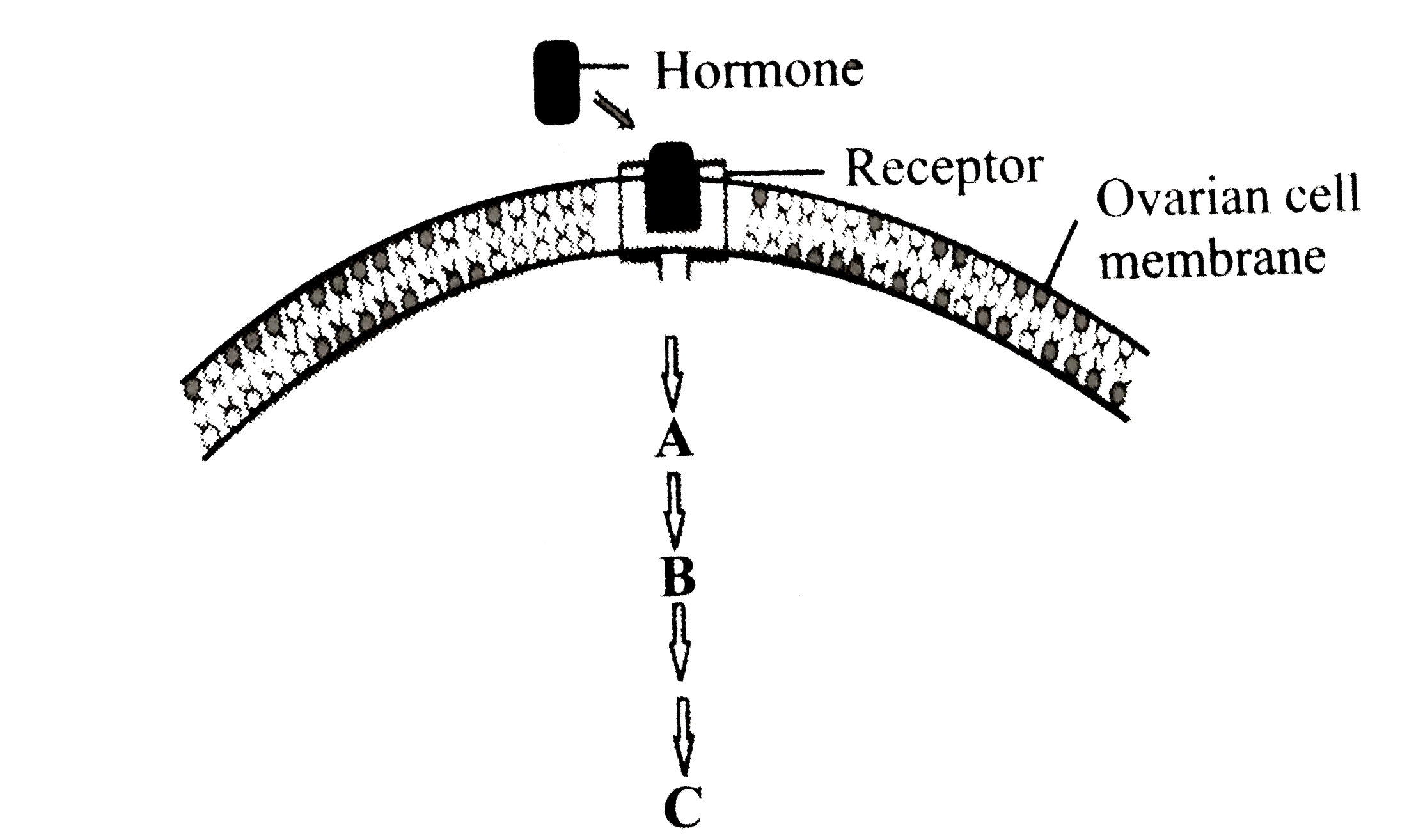In the mechanism of action of a protein hormone ,one of the second messengers is
cyclic AMP
Insulin
T3
Gastrin
The correct Answer is:A
To solve the question regarding the second messenger in the mechanism of action of a protein hormone, follow these steps:
Step 1: Understand the Role of Second Messengers
Second messengers are molecules that relay signals received at receptors on the cell surface to target molecules inside the cell. They play a crucial role in the signaling pathways initiated by hormones.
Hint: Look for molecules that act as intermediaries in hormone signaling.
Step 2: Identify the Options Provided
The options given are:
1. Cyclic AMP (cAMP)
2. Insulin
3. T3 (Triiodothyronine)
4. Gastrin
Hint: Consider which of these options is known to function as a second messenger.
Step 3: Analyze Each Option
- Cyclic AMP (cAMP): This is a well-known second messenger that is produced from ATP and plays a significant role in the signaling pathways of many hormones, particularly protein hormones.
- Insulin: This is a protein hormone itself, not a second messenger.
- T3 (Triiodothyronine): This is a thyroid hormone, not a second messenger.
- Gastrin: This is a hormone that stimulates gastric acid secretion, but it is not classified as a second messenger.
Hint: Recall the definition of second messengers and their examples in cellular signaling.
Step 4: Conclude the Correct Answer
Based on the analysis, the only option that fits the definition of a second messenger in the mechanism of action of protein hormones is Cyclic AMP (cAMP).
Final Answer: The correct option is 1. Cyclic AMP (cAMP).
Second messengers are molecules that relay signals received at receptors on the cell surface to target molecules inside the cell. They play a crucial role in the signaling pathways initiated by hormones.
The options given are:
1. Cyclic AMP (cAMP)
2. Insulin
3. T3 (Triiodothyronine)
4. Gastrin
- Cyclic AMP (cAMP): This is a well-known second messenger that is produced from ATP and plays a significant role in the signaling pathways of many hormones, particularly protein hormones.
- Insulin: This is a protein hormone itself, not a second messenger.
- T3 (Triiodothyronine): This is a thyroid hormone, not a second messenger.
- Gastrin: This is a hormone that stimulates gastric acid secretion, but it is not classified as a second messenger.
Based on the analysis, the only option that fits the definition of a second messenger in the mechanism of action of protein hormones is Cyclic AMP (cAMP).
Topper's Solved these Questions
- CHEMICAL COORDINATION AND INTERGRATIONBook:AAKASH SERIESChapter:CHEMICAL COORDINATION AND INTERGRATIONExercise:Exercise-II(Endorcrine glands and Hormones)
Explore 5 Videos
- CHEMICAL COORDINATION AND INTERGRATIONBook:AAKASH SERIESChapter:CHEMICAL COORDINATION AND INTERGRATIONExercise:Exercise-II(Human endocrine system)
Explore 9 Videos
- CHEMICAL COORDINATION AND INTERGRATIONBook:AAKASH SERIESChapter:CHEMICAL COORDINATION AND INTERGRATIONExercise:Exercise-I(Hormones produced by other organs)
Explore 18 Videos
- BREATHING AND EXCHANGE OF GASES Book:AAKASH SERIESChapter:BREATHING AND EXCHANGE OF GASES Exercise:EXERCISE-III (Previous AIPMT/NEET Questions)
Explore 21 Videos
- DIGESTION AND ABSORPTIONBook:AAKASH SERIESChapter:DIGESTION AND ABSORPTIONExercise:Exercise - III (Previous AIPMT/NEET Questions)
Explore 24 Videos
Similar Questions
Second messenger is
View SolutionSome hormones need the secondary messenger because
View SolutionRefer to the given diagrammatic representation of the machanism of action of a protein hormone.

In which of the following options correct labelling of A,B and C is given?
View SolutionExplain the mechanism of action of enzyme.
View SolutionWhich one is a protein hormone
View SolutionGive the mechanism of the action of carbon monoxide.
View SolutionIllustrate the diffrences between the mechanism of action of a protein and a steroid hormone.
View SolutionThe mechanism of action of a steroidal hormone on target cell is established through the
View SolutionWhich of these hormones uses cAMP as a second messenger ?
View SolutionExplain the mechanism of action of T cells to antigens.
View Solution
